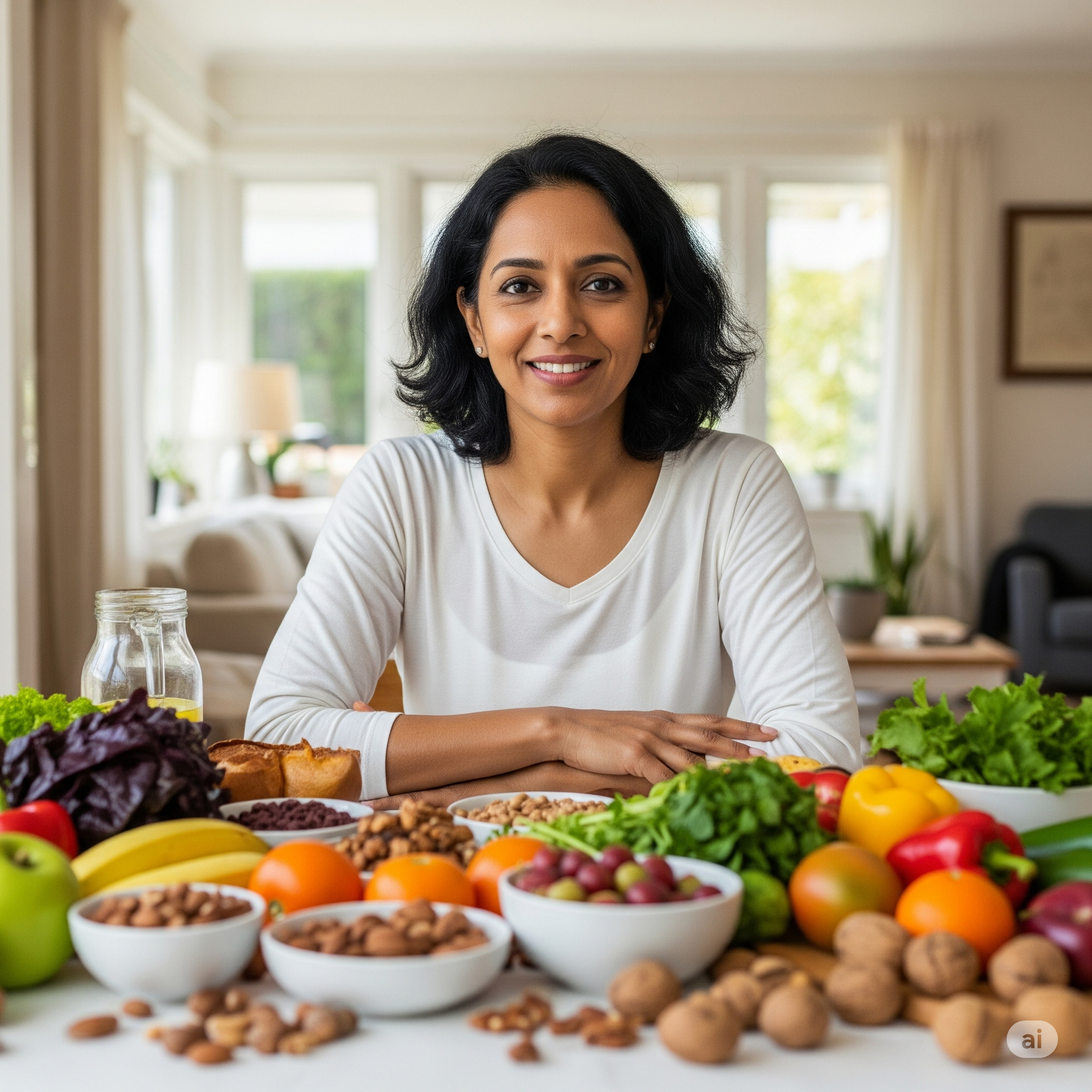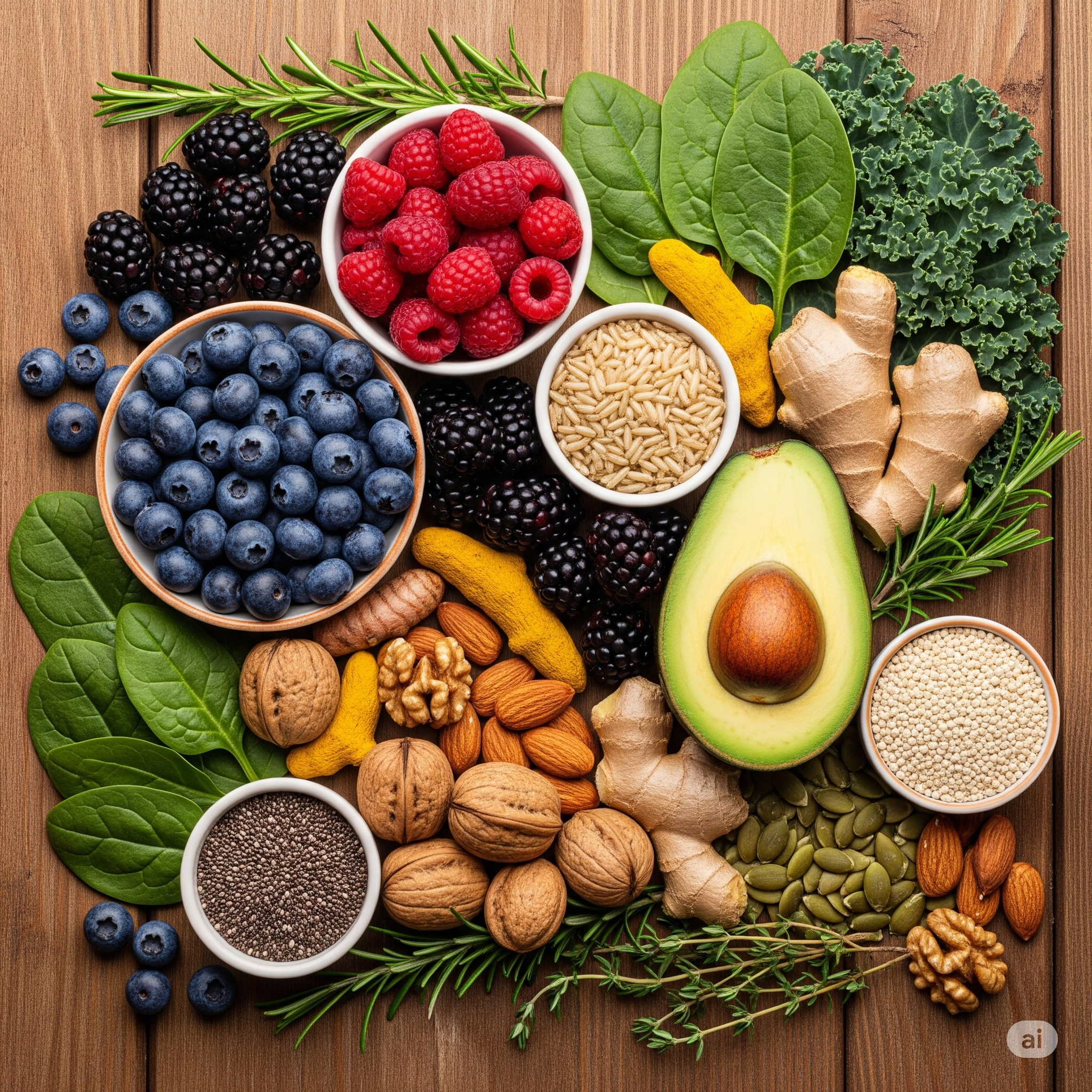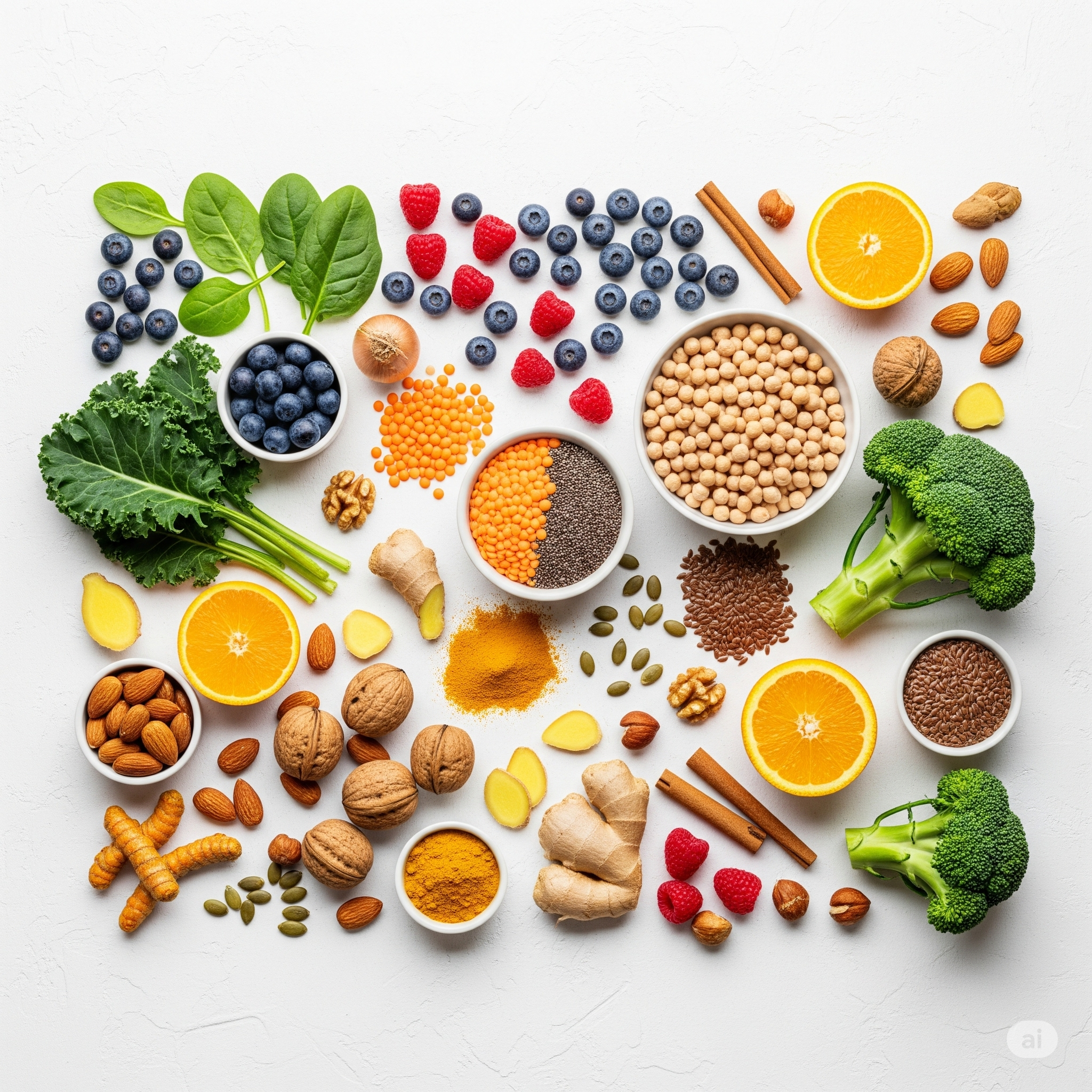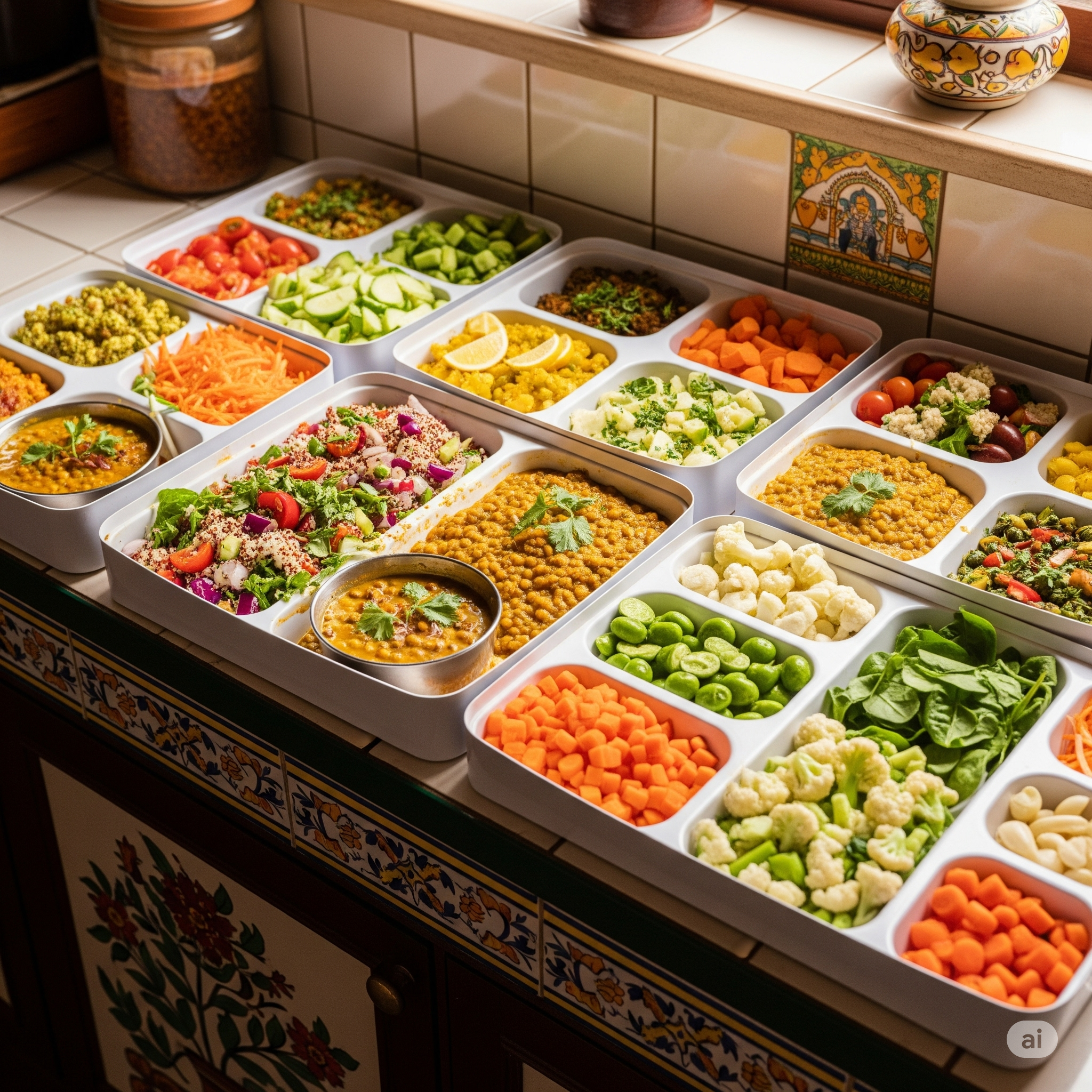Meta Description:
Learn the benefits of a vegetarian anti-inflammatory diet, the foods it includes, and a detailed diet plan. Reduce inflammation and live a healthy life.

Introduction
In today’s fast-paced lifestyle, inflammation has become a common problem that is the root cause of countless health problems. Stress, poor eating habits, and environmental factors can promote chronic inflammation in our bodies, leading to serious diseases like arthritis, heart disease, diabetes, and even some types of cancer. But did you know that your eating habits can play a vital role in reducing this inflammation? A vegan anti-inflammatory diet is a powerful step in this direction. It not only helps your body heal from within, but also helps you live an energetic and healthy life.
In this blog post, we will explore in detail the deeper principles of a vegan anti-inflammatory diet, its amazing health benefits, and the foods you should include on your plate. We will also provide a practical 7-day diet plan that will help you adopt this healthy lifestyle. If you want to improve your overall health by reducing inflammation, then this article is for you.
Section 1: What is inflammation and how does it affect your health?
Inflammation is a natural response of the body that helps fight injury or infection. It is an essential process that aids the body in healing. When you sprain your ankle or have the flu, your body produces inflammation to repair damaged tissue and eliminate invading pathogens. This is called ‘acute inflammation’, and it usually resolves within a few days or weeks.
However, problems arise when inflammation becomes chronic. ‘Chronic inflammation’ occurs when the body is in a constant state of inflammation, even when there is no obvious injury or infection. It can be caused by a number of factors, such as poor diet, stress, environmental toxins, and a sedentary lifestyle. Chronic inflammation is often subtle and its symptoms are not immediately obvious, but over time it can cause serious damage to the body.
Some common symptoms of chronic inflammation include persistent fatigue, joint pain, digestive problems, skin problems, and brain fog. It’s linked to many serious diseases, including arthritis, heart disease, diabetes, obesity, Alzheimer’s disease, and some types of cancer [1]. Reducing inflammation is important for reducing the risk of these diseases and improving overall health.
Reference: https://www.medicalnewstoday.com/articles/320233
Section 2: What is a Vegetarian Anti-Inflammatory Diet?

A vegan anti-inflammatory diet is a diet that focuses primarily on plant-based foods, which have powerful anti-inflammatory properties. The main principle of this diet is to consume foods that help reduce inflammation in the body, while avoiding foods that may promote inflammation. It is not just a diet plan, but a lifestyle that promotes overall health and wellness.
The vegan aspect of this diet is important because animal-based products, especially red meat and dairy products, often contain compounds that can increase inflammation in some individuals. In contrast, a well-planned vegan diet is rich in fiber, antioxidants, vitamins, and minerals, all of which play an important role in fighting inflammation. In addition to the ethical and environmental benefits, vegan diets have also been linked to a lower risk of heart disease, type 2 diabetes, and certain cancers, which may be related to its anti-inflammatory effects.
The main components of a vegan anti-inflammatory diet include:
•Whole foods: The emphasis is on unprocessed foods such as fruits, vegetables, whole grains and legumes rather than processed foods.
•Plant-based proteins: Lentils, chickpeas, tofu, tempeh, nuts and seeds are excellent sources of protein that also help reduce inflammation.
•Healthy fats: Omega-3 fatty acids from avocado, olive oil, nuts and seeds are anti-inflammatory and beneficial for heart health.
•Antioxidants: Colorful fruits and vegetables are rich in antioxidants that protect the body from free radical damage and reduce inflammation.
In short, this diet uses nature’s most powerful foods to nourish the body and reduce inflammation, leading to a healthier and more balanced internal environment.
Section 3: Amazing Benefits of a Vegetarian Anti-Inflammatory Diet

Adopting a vegan anti-inflammatory diet can have many positive effects on your health. It is not just limited to reducing inflammation, but it also promotes overall well-being. Here are some of the key benefits of this diet:
•Reduces the risk of chronic diseases: As mentioned earlier, chronic inflammation is associated with many serious diseases. A vegan anti-inflammatory diet, which includes foods rich in antioxidants and phytochemicals, helps reduce the risk of these diseases, such as arthritis, heart disease, type 2 diabetes, and certain types of cancer [2].
•Helps in weight management: This diet is usually rich in fiber and low in calories, making you feel full for longer. This reduces unnecessary snacking and helps maintain a healthy weight or lose weight. Fiber is also important for digestive health and helps keep blood sugar levels stable.
•Improved heart health: Plant-based foods are cholesterol-free and low in saturated fat. Healthy fat sources like nuts, seeds, and avocado provide omega-3 fatty acids that are beneficial for the heart. This combination helps lower blood pressure, improve cholesterol levels, and reduce the risk of heart disease.
•Improved digestive health: The high fiber content in this diet promotes regular bowel movements and supports a healthy gut microbiome. A healthy gut plays a key role in reducing inflammation and improving nutrient absorption.
•Increased energy levels and reduced fatigue: When the body is constantly fighting inflammation, it consumes energy. Reducing inflammation saves the body energy, making you feel more energetic and relieving chronic fatigue.
•Skin and hair health: Foods rich in antioxidants and vitamins protect the skin from free radical damage, making the skin look healthy and glowing. It also promotes hair health.
•Improved mental clarity and mood: Some studies suggest a link between inflammation and mood disorders such as depression and anxiety. Reducing inflammation may improve brain health, leading to better mental clarity and improved mood.
Reference:https://www.healthline.com/nutrition/anti-inflammatory-diet-101
Section 4: What to Eat and What Not to Eat in a Vegetarian Anti-Inflammatory Diet

It is not difficult to follow a vegetarian anti-inflammatory diet, especially when you know which foods to prioritize and which ones to avoid. Here is a detailed list that will help you make the right choices:
What to eat (vegetarian foods that reduce inflammation):
Fruits: Berries (blueberries, raspberries, strawberries), cherries, apples, pears, oranges, and other colorful fruits are rich in antioxidants and vitamin C, which fight inflammation.
•Vegetables: Green leafy vegetables (spinach, kale, collard greens), broccoli, cabbage, cauliflower, Brussels sprouts, tomatoes, bell peppers, onions, garlic, and sweet potatoes. These are all rich in phytochemicals and fiber.
•Legumes and pulses: Lentils (moong, masoor, tur), chickpeas, kidney beans, black beans, and peas. These are excellent sources of plant-based protein, fiber, and various minerals.
•Whole grains: Quinoa, brown rice, millet, oats, and whole wheat bread. These provide complex carbohydrates and fiber, which help keep blood sugar stable and reduce inflammation.
•Nuts and seeds: Almonds, walnuts, chia seeds, flax seeds, pumpkin seeds, and sunflower seeds. These are rich in healthy fats (especially omega-3 fatty acids), protein, and fiber.
•Healthy fats: Avocado, olive oil (extra virgin), and coconut oil. These provide monounsaturated and polyunsaturated fats that are anti-inflammatory.
•Spices and herbs: Turmeric (with curcumin), ginger, cinnamon, garlic, and rosemary. These contain powerful anti-inflammatory compounds.
•Probiotics: Fermented foods like kimchi, sauerkraut, and plant-based yogurt. These support a healthy gut microbiome, which is important in reducing inflammation.
•Drinks: Green tea, herbal teas, and plenty of water.
What not to eat (inflammation-increasing foods):
•Processed foods: Packaged snacks, fast food, and highly processed meals that often contain unhealthy fats, sugar, and artificial ingredients.
•Refined sugars: Candy, soda, pastries, and other sweetened beverages and foods. Excess sugar promotes inflammation in the body.
•Trans fats and partially hydrogenated oils: Found in margarine, some baked goods, and fried foods. These are one of the biggest culprits of inflammation.
•Dairy products: Milk, cheese, and yogurt (if not plant-based). Dairy products can cause inflammation in some people.
•Red meat and processed meats: Beef, pork, lamb, and processed meats like sausage, bacon. These contain saturated fats and other compounds that can increase inflammation.
•Refined grains: White bread, white rice, and pasta. They are low in fiber and nutrients and can cause a rapid spike in blood sugar.
•Alcohol: Excessive alcohol consumption can increase inflammation in the body.
By choosing the right foods and avoiding foods that increase inflammation, you can help your body heal from within and live a healthier, more energetic life.
Section 5: 7-Day Vegetarian Anti-Inflammatory Diet Plan

To make it easier to incorporate a vegetarian anti-inflammatory diet into your routine, here is a sample 7-day diet plan. This plan offers variety and ensures that you get all the necessary nutrients. You can change the foods according to your preference and availability.
Day 1:
•Breakfast: Oatmeal (made in almond milk) with berries and chia seeds.
•Lunch: Quinoa salad with cucumber, tomato, capsicum, and boiled chickpeas, with olive oil and lemon juice dressing.
•Evening snack: An apple and handful of almonds.
•Dinner: Lentils (moong dal) and brown rice with turmeric and ginger, with green vegetable curry.
Day 2:
•Breakfast: Tofu scramble containing spinach, onion, and mushrooms, with whole grain toast.
•Lunch: Mixed green vegetable soup containing lentils and vegetables.
•Evening snack: Carrots and hummus.
•Dinner: Vegetable stir-fry with veggies and tempeh, served with brown rice noodles.
Day 3:
•Breakfast: Smoothie containing kale, banana, flax seeds, and almond milk.
•Lunch: Rajma rice with fresh cilantro and onion.
•Evening snack: Orange slices.
•Dinner: Black bean burger (on a whole grain bun) with roasted sweet potato and broccoli.
Day 4:
•Breakfast: Avocado toast (on whole grain bread) with chia seeds.
•Lunch: Black bean burger with leftovers from yesterday’s dinner.
•Evening snack: Handful of walnuts.
•Dinner: Whole wheat pasta with spinach and mushrooms in a tomato-based sauce.
Day 5:
•Breakfast: Fruit salad containing berries, apples, and pomegranates.
•Lunch: Lentil soup and whole grain roti.
•Evening snack: Cucumber slices.
•Dinner: Vegetable curry with coconut milk and various vegetables with bajra roti.
Day 6:
•Breakfast: Chia seeds pudding soaked in almond milk with fresh fruit.
•Lunch: Salad with chickpeas and vegetables with olive oil and vinegar dressing.
•Evening snack: A pear.
•Dinner: Tofu and vegetable kebabs with quinoa.
Day 7:
•Breakfast: Moong dal chilla (pancakes) with green chutney.
•Lunch: Leftover tofu and vegetable kebabs from yesterday’s dinner.
•Evening snack: Handful of pumpkin seeds.
•Dinner: Vegetable pulao with mixed vegetables and lentils.This diet plan will help you experience a wide range of vegetarian anti-inflammatory foods. Remember, it is also important to stay hydrated, so drink enough water throughout the day.
conclusion
The Vegan Anti-Inflammatory Diet is not just a diet, but a powerful tool that can help you fight chronic inflammation and improve your health. By following this diet, you not only nourish your body from within, but also reduce your risk of many serious diseases, aid in weight management, and improve your energy levels and mental clarity.
Remember, start with small changes. Add more fruits, vegetables, whole grains, and legumes to your plate. Slowly cut out processed foods, added sugar, and unhealthy fats. Listen to your body and see which foods make you feel best.
This diet is a journey, not a destination. Be patient, experiment, and most importantly, enjoy it! If you have any underlying health conditions, always consult a qualified health professional or dietitian before making any major dietary changes. Best of luck on your journey towards a healthy and inflammation-free life!